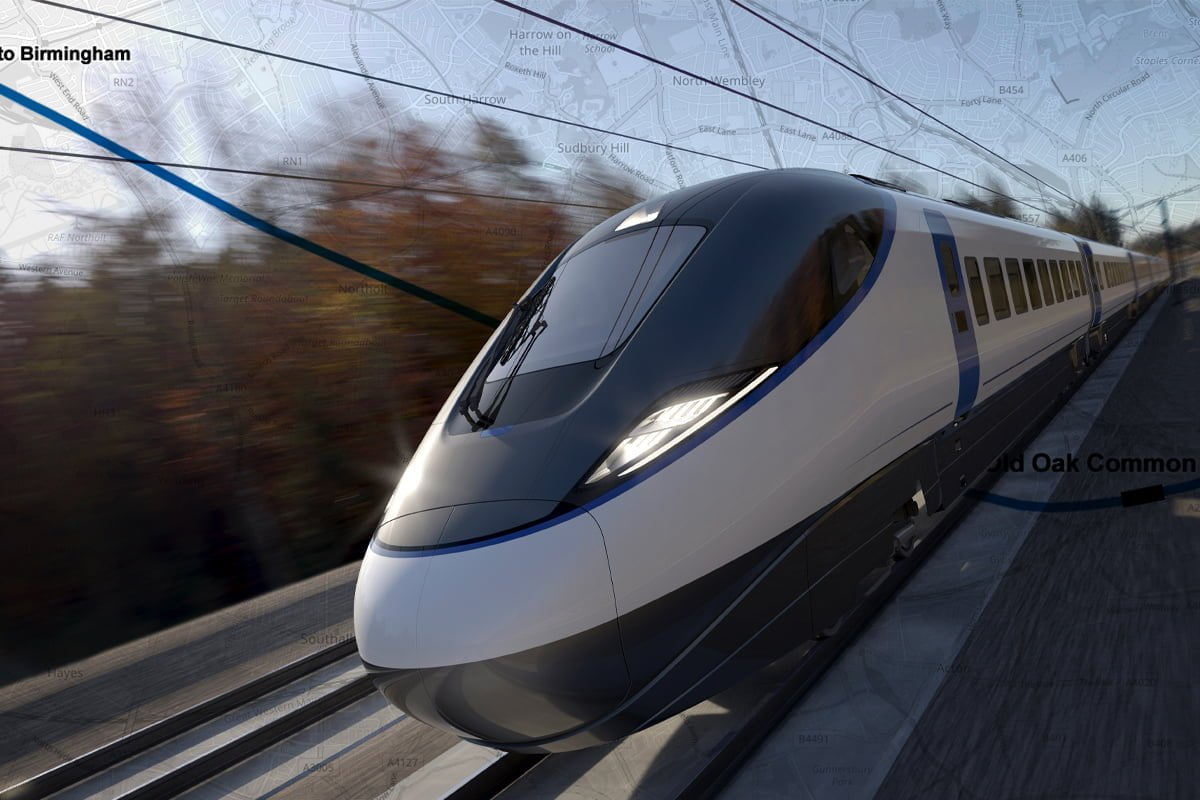Cutting planned HS2 routes, and announcing higher and higher costs for the project, has become something of a monthly tradition for the carousel of Tory transport secretaries in recent years.
The estimated budget for the new high-speed rail network has ballooned – from around £33 billion in 2010 to over £100 billion today. This is despite the project being dramatically scaled back compared to what was originally planned.
The eastern leg from Birmingham to Leeds, for example, was scrapped long ago. Similarly with the link between the North West and Scotland. Both were cut in order to reduce soaring costs. And government ministers have now said that other sections are likely to be trimmed or delayed.
Delays and costs

The London-Birmingham line, originally due to be finished by 2026, is now expected to be completed between 2029-33.
Adding insult to injury, rather than going straight to central London, passengers will have to travel to the west-London suburb of Old Oak Common, before travelling for 30 minutes on the Elizabeth line to Euston.
This will make the predicted 29-minute reduction in journey time from Birmingham to London completely redundant. And it could result in overcrowding and overcapacity on the Lizzy line for almost a decade, until the final furlong to Euston is completed and trains are fully up-and-running – in around 2041.
Tory levelling-up secretary Michael Gove, meanwhile, refuses to guarantee that HS2 will even terminate at Euston at all.
The senior cabinet minister has revealed that there is an on-going debate within the government about whether to scrap the plans for the new London terminus entirely, despite over £2 billion having already been spent on it.
Lagging behind
Looking for a reliable scapegoat, Tory transport secretary Mark Harper has even pointed the finger at none other than Vladimir Putin for the delays and rising costs!
In reality, however, far from being the fault of the Russian president, the HS2 farce is a vivid illustration of the decrepit nature of British capitalism.
In the heyday of the Empire, Britain’s railways and grandiose stations were a symbol of her economic and industrial dominance. Now they reflect British capitalism’s decline and degeneration.
A comparison with other countries highlights this. In France, there is 2,735km of dedicated high-speed rail track. Germany has 1,630km; Turkey 724km; and China 42,000km.
‘Great’ Britain weighs-in with a paltry 113km – leading the world only in terms of inefficiency, ineptitude, and bungling when it comes to the construction of key infrastructure.
This lays bare the parasitism and weakness of British capitalism for all to see. The UK is lagging far behind other advanced capitalist countries and major powers. Its (in)ability to invest in a modern transport network is but one manifestation of this.
Winners and losers

Amidst this sea of incompetency and corruption, it is workers who are footing the bill.
Many families across the country have been relocated to make way for the proposed route. In Camden, London, homes have been demolished, graves have been exhumed, and a public park and several businesses have been closed down and demolished.
Now it is unclear whether any of this was even necessary, as plans are altered or scrapped.
At the same time, following the downsizing of the proposed Euston station, hundreds of contracted architecture and construction staff will be made redundant.
For the Tory government, meanwhile, HS2 has become a white elephant. Costs are spiralling, and delays are mounting. The finish line is constantly receding into the distance. Consequently, calls to pull the plug are growing.
But the Tories cannot backtrack and cancel this project, as this would be another humiliating blow to their prestige; the latest embarrassing U-turn in a comedy of errors for this ill-fated regime.
At the same time, why would they slaughter this veritable cash-cow for their capitalist chums?
As always, the real winners are the bosses, who have milked HS2 for all its worth. In 2020, for example, it was found that big construction firms were accruing around £4 million a day from the public purse, thanks to healthy government contracts.
Even if the whole project were cancelled tomorrow, these same fat-cat bosses would continue to rake it in through generous government compensation. For the capitalists, it is a case of ‘heads we win, tails you lose’.
Rotten system

Many have pointed to the mismanagement and corruption surrounding HS2, and to the environmental damage caused by the project, and have understandably drawn the conclusion that it is not worth all the pain.
What is revealed here, however, is not the unviability of large-scale infrastructure investment, but the rotten nature of British capitalism.
UK trains are criminally overcrowded, with some filled to over twice their intended capacity. Services are consistently delayed or cancelled. And when heatwaves strike, as is becoming ever-more likely due to climate change, tracks are prone to buckle.
The construction of new lines would help to relieve these pressures, and would improve connectivity for areas such as the North and the East of England, which are particularly poorly-served in terms of rail infrastructure.
Investment is vitally needed. The issue is that, under capitalism, it is the capitalist class who will reap all the benefits, syphoning public money into their pockets at every opportunity, while workers pick up the tab.
Capitalism is an inherently chaotic, corrupt system of production for profit. The setbacks and overspending on projects such as these, in this respect, are part-and-parcel of building and running infrastructure on a capitalist basis.
For this reason, even if HS2 were somehow constructed without a single hitch, it would still be plagued by the same poor maintenance, delays, and rising fares that passengers enjoy on the rest of the rail network.
Socialist plan
The solution is to nationalise the major rail and construction companies, and to place these monopolies under the democratic control of the working class – those whose labour keeps the trains running, and who use these services every day.
On this basis, as part of a socialist planned economy, we could carry out a massive programme of investment to modernise Britain’s dilapidated transport networks, funded by expropriating the bankers and billionaires.
Only in this way can we ensure that large-scale projects such as HS2 are carried out on the basis of what society needs, rather than what is profitable for the bosses.






